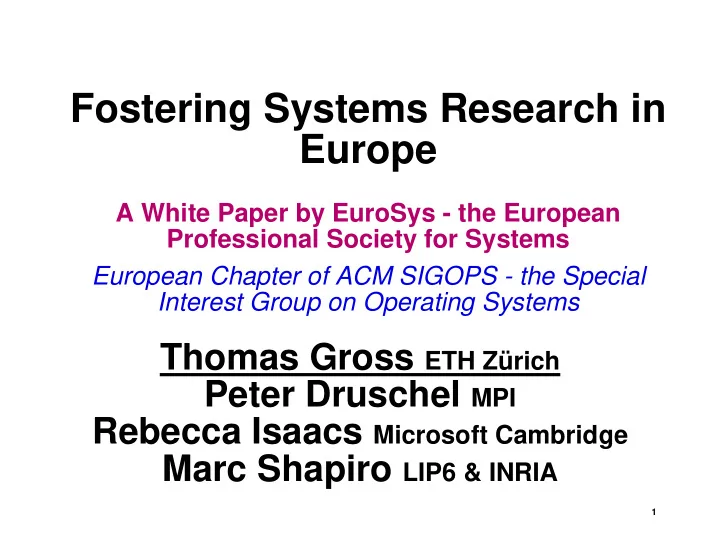

Fostering Systems Research in Europe A White Paper by EuroSys - the European Professional Society for Systems European Chapter of ACM SIGOPS - the Special Interest Group on Operating Systems Thomas Gross ETH Zürich Peter Druschel MPI Rebecca Isaacs Microsoft Cambridge Marc Shapiro LIP6 & INRIA 1
Outline • Why are we here? • Systems • EuroSys • Recommendations – For the Systems community – For department heads, deans, and presidents – For industry • Concluding remarks 2
Why are we here? • Many important contributions in systems from Europe • European systems research not as effective as possible (or necessary) • Europe runs the risk to miss out on important developments 3
Why are we here? • Europe lately attractive for US-educated researchers • European companies world leaders – Require Systems expertise • Our plan: – Change limiting aspects of environment – Recommendations for • Systems community • Deans, department heads, presidents • Industry and policy makers 4
Systems Union of • Operating systems • Distributed systems • Embedded/real time systems • Pervasive systems • Core tools (language runtime systems, networks, compilers) Systems research is the scientific study, analysis, modeling and engineering of effective software platforms 5
Systems in Computer Science Many of our recommendations or findings also apply to other parts of CS Special considerations: – Experimental science – Long cycles • Design • Implementation • Evaluation • Publication – Technology constraints 6
Systems research • Systems a core computer science research area – Drives and builds upon results in many other parts of computer science: � Theory � Software Engineering � Information systems � Graphics • Hypothesis: what’s good for systems is good for computer science 7
Systems research • Essential for many companies – Amazon, eBay, Google, HP, IBM, Iona, Microsoft, RedHat, Sun, Suse, Symbian, VMWare … – Airbus, Nokia, Philips, Siemens, STM, Thomson – Automotive industry – Financial industry • Essential for society • Hard research challenges remain 8
Research challenges • Security • Reliability • Scale and diversity • Data storage and filtering • Managing complexity • Sensor integration 9
EuroSys • European professional society for Systems research • Chapter of ACM SIGOPS (Special Interest Group on Operating Systems) • European strengths • European weaknesses 10
European strengths • Important Systems contributions from Europe – Not exclusive -- just a few examples – Xen virtual machine – MARS real-time operating system – L4 microkernel – Camille embedded OS • Open source development – Linux started here … – So did the WWW 11
European weaknesses • Short duration of Ph.D. program – Top US schools: 5-7 years – Many European universities: 3 years – Often no Ph.D. program • Ph.D. students vs. research assistants • Advanced classes • Size of Systems group(s) – Isolation • Funding constraints – Grant/contract 2-3 years vs. 4-6 year projects – Major conferences every 1.5 to 2 years 12
European weaknesses • Industry relations – No Ph.D. student internships – Lack of Ph.D. employment – Limited cooperation with universities – Systems research inside industrial research labs – Sabbaticals of staff from industry in academia rare 13
Recommendations - Systems community • Get organized • Improve student mobility – Internships in labs, other groups • Networking – EuroSys 2006 conference - 170 attendees in Leuven – EuroSys 2007 conference in Lisbon – Senior workshops • Enhance Ph.D. education – Authoring workshops – Database of assistantships/scholarships 14
Recommendations - institutions • Ph.D. programs – Combine (research) Master’s with Ph.D. program – Be flexible w/ respect to length • Output oriented – Education of the next generation, not cheap labor for the chair • Fair payment • Appropriate classes (and exams), breadth – Thesis committees • 3 to 4 members • External member(s) – Allow internships 15
Recommendations - institutions • Faculty – Hire from the outside – Assistant professor model • Independent, principal investigator • Advisor of Ph.D. students • Attractive for the best talent – Realistic expectations • Building systems labor-intensive • Publications one way to disseminate knowledge • 1 significant publication > 10 “write-only” papers • Teaching load < 15 hrs (preparation + contact hrs) – Tenure-track model • At least 6 years to establish record 16
Recommendations - industry • Get involved • Hire Ph.D.s – The right ones • Offer internships 17
Concluding remarks • Systems crucial for European industry, society and academia • Long range and short range steps • Become a member – Encourage your colleagues – Send your Systems faculty to EuroSys conferences and workshops www.eurosys.org 18
Recommend
More recommend